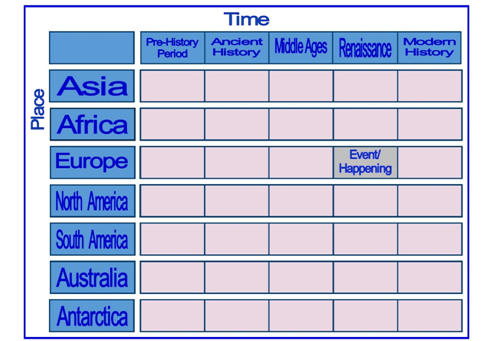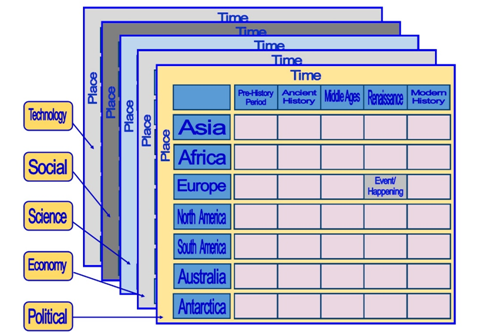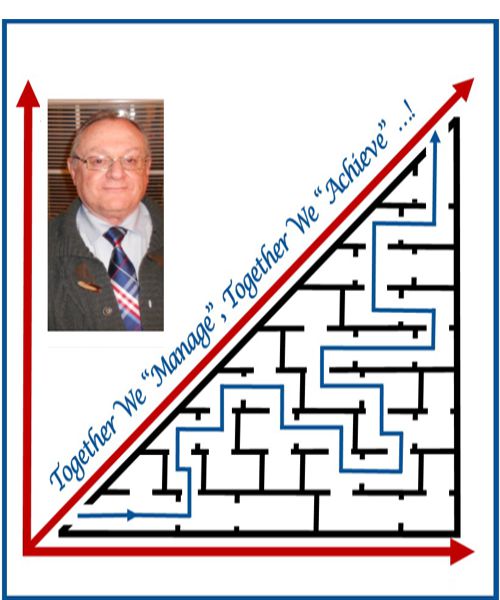Viewpoint
» On "Teaching"
» On "Learning"
» On "Knowledge"
» On "Goals"
» On "Time"
» On “Management”
» On “Reading”
» On "Committees"
» On "A Place to Visit"
» On "Human Resources"
» On "Progress & Development"
» On "History"
» On "Public Speaking"
» On "Organizing"
» On "Motivation"
» On "Teams"
» On "Communication"
» On "Management Coaching"
» On "Traveling"


On "History"
By Adel J. Helou
To be able to stand and deliver a speech or History is one of the most interesting fields an individual can read or study. This field - as you may well know - describes the story of Man and his environment. This field of knowledge includes all of man’s thoughts, words, and actions - encompassing man’s discoveries, inventions, and achievements - in all the fields of knowledge, from the study of space, the moon, and the stars (Astronomy) to the fields of Geology, Meteorology, Oceanology. The list goes on to include the humanities, sciences, and technologies. Let us not forget management, finance, economics, political and military sciences.
In general, historical information is identified by three elements. These elements are Time, Place/Location, and Event (people and action – or happening). To better appreciate history and retain historical information a person can use the well-known method of presenting the information in a two-dimensional grid or table (figure – 1). This format has one axis representing time and the other axis representing place. Where these two points meet within the grid there will be the event that took place (at that time and place). Using this format helps in organizing history and historical events. It also facilitates the study of history for students of the subject as well as individuals interested in history.
To make history more interesting and a bit more complete a third dimension may be introduced to represent the various fields under study or of interest and their events during the same time and same location (figure – 2). To clarify this statement, a person may want to know the history of what happened in Europe in the 14th century in the fields of Politics, Economics, Science, Technology, and Social Life. Each one of these fields will be represented by a different grid/table (plane) along a third axis.

Figure – 1: Two-Dimensional Grid

Figure – 2: Three-Dimensional Grid
Some persons studying history may be interested in the history of one country and in one aspect (one field) of that history; for example, the social history of England during the Middle Ages. Some other persons may be interested in more than one aspect of the history of England; let us say, social and economic development or changes. A third group of people may be interested in the same fields or aspects of history in England and France, during the same period. This last group may be doing some comparative study between the two countries.
The two- or three-dimensional grids not only can organize historical information but can also help students of history run their comparative studies between different places and the developments of different fields of knowledge during a specific period. Amateur and serious readers of history can do the same.
There are many benefits in reading and studying history. Here are a few of these benefits:
- Learning about the past and knowing how the earlier generations lived.
- Reading about the events that shaped the world in the many different fields of life.
- Learning about the persons in the past that helped make life better for the later generation.
- Learning about the early discoverers and their discoveries which helped develop fields like geography, history, botany, pharmacy, and medicine.
- Reading about the inventors and the inventions that made life easier and/or healthier.
- Learning how ideas and thoughts traveled from one place on earth to another and how much time they took to make the journey.
- Allowing the present generation to analyze and evaluate previous thoughts, words, and actions. In turn, they can develop their own conclusion regarding the validity of these thoughts, words, and actions.
- Allowing the present generation to learn lessons from the past. This will help avoid past mistakes and confirm/affirm correct and successful thoughts, words, and actions taken in the past.
Now is an appropriate time to indicate that every thought, word, and/or action that everyone has, says, and/or does; becomes a building block of the history of man.
People are making history as they go on their normal daily lives. It becomes interesting when you look at it in this way. Doesn’t it?
Adel J Helou: is a Business and Life Management Coach. He has more than 15 years of experience in production and operations management. The Author has international professional experience in the Middle East markets. He holds a B.Sc. degree in Chemistry and Physics and an M.Sc. in Chemical Engineering. Mr. Helou has pages on Facebook, LinkedIn, Twitter, and Instagram:
facebook.com/AdelJosephHelouManagementCoach/
linkedin.com/in/adeljosephheloumanagementcoach/
Instagram.com/adel.helou
twitter.com/helou_adel
Read about his Management Coaching and the articles he writes, by visiting the electronic magazine (E-Zine): optimanage.com.
The E-Zine has a fb page: facebook.com/optimanagedotcom/.
A.J. Helou can be contacted by e-mail: a.j.helou@optimanage.com (e-mail)
linkedin.com/in/adeljosephheloumanagementcoach/
Instagram.com/adel.helou
twitter.com/helou_adel
Read about his Management Coaching and the articles he writes, by visiting the electronic magazine (E-Zine): optimanage.com.
The E-Zine has a fb page: facebook.com/optimanagedotcom/.
A.J. Helou can be contacted by e-mail: a.j.helou@optimanage.com (e-mail)




